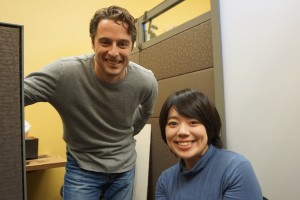この記事は次の言語でも読めます:日本語

For my very last interview during this trip to Minnesota, I visited Mr. Derek Nord, an Associate Director of Research and Training Center at the Institute on Community Integration (ICI) located in University of Minnesota.
Derek shared his vivid memories of childhood.
He had a friend from his mother’s daycare. When he and his friend came back from a day camp, he saw the mother of his friend was crying.
As a little kid, he didn’t really understand the situation at that time.
However, later he got to know that she cried because she had never seen that her son with intellectual disability was included like everyone.
After finishing his study in college, he started the first job to support vocational services to people with intellectual and developmental disabilities.
He realized there are a lot of issues between people with disabilities and the employers.
The employment relationship was not always a straight-line.
Later, he went to graduate school and researched how he can change this environment and the policy to support people with disabilities and the community they live.
ICI is a grant funded organization where has more than 100 researchers, trainers, and advocates.
At the Research and Training Center, they share information, and develop trainings, services and supports for people with intellectual and developmental disabilities mainly focused on community living and adult network services.
Also they provide consultation and support to state government, local government, policymaker as well as disability service community.
Here at ICI, Derek focuses on researching the employment service, supports and policy.

Derek mentioned that one of the issues that people with disabilities are facing is limit employment opportunities and inadequate supports in the U.S.
As I explained in this blog before, in the US if people with disabilities want to work at a regular company, most need to apply and get an offer from the company and compete with other people without disabilities.
There is no special position just for people with disabilities which Japan do have.
Derek thinks that this competitive hiring process is a major barrier for people with severe disabilities since job postings often lack alignment and customizations with the unique skill set that a person has, thus leaving people with significant barriers to compete with the general public on a job that requires all skills (rather than a subset).

In Japan, large corporations usually set up subsidiary companies to hire the people with disabilities who cannot compete with people without disabilities and work at a regular job position.
Those large corporations can count employees with disabilities who are working at their subsidiary companies to comply with Japan’s employment law of keeping 2% of their total job positions to people with disabilities when their total employees exceed 50.
Those jobs at the subsidiary companies provide better salary and working environment compared to work shelters do.
However, since wide range of disabled employees work at one place, job quantity and quality are not good enough and it’s hard to develop a good career in there.
Depending on each one’s disability and each company’s business strategy, situations would be different, but it is also true that the employees usually cannot transfer to the parent company once they join the special subsidiary company, even after they have enough working experiences.
When I was in Japan, I met many disabled people who work for special subsidiary companies but after talking to them, I really felt that they could work at regular company if the company provides necessary reasonable accommodation with right understanding for people with disabilities.
I think that the special subsidiary company system is not bad and is needed for some severe disabled people.
However, it also needs some shifts to think about developing disabled employees’ career, not to think about hiring them just to comply with the employment law.
By doing so, the role of special subsidiary company is more meaningful.
To train people with disabilities and help them go out into the “real world” and compete to build their career is much meaning, I believe.
